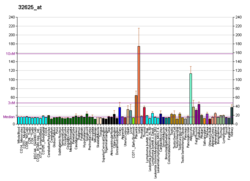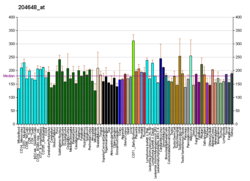Natriuretic_peptide_receptor_A
NPR1
Protein-coding gene in the species Homo sapiens
Natriuretic peptide receptor A/guanylate cyclase A (atrionatriuretic peptide receptor A), also known as NPR1, is an atrial natriuretic peptide receptor. In humans it is encoded by the NPR1 gene.
NPR1 is a membrane-bound guanylate cyclase that serves as the receptor for both atrial and brain natriuretic peptides (ANP and BNP, respectively).[5]
It is localized in the kidney[6] where it results in natriuresis upon binding to natriuretic peptides. However, it is found in even greater quantity in the lungs and adipocytes.[6]
- "Human PubMed Reference:". National Center for Biotechnology Information, U.S. National Library of Medicine.
- "Mouse PubMed Reference:". National Center for Biotechnology Information, U.S. National Library of Medicine.
- BioGPS > NPR1 Retrieved Nov 2010 Archived November 27, 2010, at the Wayback Machine
- Pandey KN (2002). "Intracellular trafficking and metabolic turnover of ligand-bound guanylyl cyclase/atrial natriuretic peptide receptor-A into subcellular compartments". Mol. Cell. Biochem. 230 (1–2): 61–72. doi:10.1023/A:1014240006767. PMID 11952097. S2CID 10397726.
- Lucarelli K, Iacoviello M, Dessì-Fulgheri P, et al. (2003). "[Natriuretic peptides and essential arterial hypertension]". Italian Heart Journal Supplement. 3 (11): 1085–91. PMID 12506509.
- Pandey KN (2005). "Internalization and trafficking of guanylyl cyclase/natriuretic peptide receptor-A". Peptides. 26 (6): 985–1000. doi:10.1016/j.peptides.2004.12.020. PMID 15911067. S2CID 34452043.
- Garg R, Pandey KN (2005). "Regulation of guanylyl cyclase/natriuretic peptide receptor-A gene expression". Peptides. 26 (6): 1009–23. doi:10.1016/j.peptides.2004.09.022. PMID 15911069. S2CID 33508201.
- NPR1+protein,+human at the U.S. National Library of Medicine Medical Subject Headings (MeSH)
This article incorporates text from the United States National Library of Medicine, which is in the public domain.
This membrane protein–related article is a stub. You can help Wikipedia by expanding it. |





